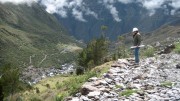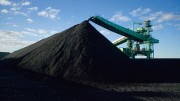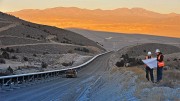The election win of the business-friendly, Liberal Party-led coalition in Australia has given a lift to miners in the country, as incoming Prime Minister Tony Abbott — the country’s third prime minister in three months — has pledged to eliminate the new mining windfall taxes and carbon-emission taxes created by the outgoing Labor government.
The four-party opposition coalition ended six years of Labor Party rule with a majority win of 88 seats in the lower house (including 57 Liberal seats), versus the 62 seats picked up by the remaining five opposition parties (including 57 won by Labor).
The Labor Party has been beset by infighting, and voters were clearly tired of it. Current Labor leader Kevin Rudd — who in June ousted sitting Prime Minister Julia Gillard, who in 2010 had forced the removal of Rudd as a sitting prime minister — won his seat but will not seek re-election as party leader.
Investors liked the housecleaning, with the major Australian stock-market indexes hitting five-year highs and consumer sentiment perking up after the election.
Speaking to supporters on election night, Abbott channelled Brian Mulroney circa 1984, declaring that “Australia is under new management and . . . Australia is once more open for business.” He repeated his pledges to move the national budget into surplus, crack down on illegal immigrants entering Australian waters and eliminate carbon taxes and mining windfall taxes.
The election also had its curiosities, with WikiLeaks founder Julian Assange only winning 0.62% of the vote in his bid for a senate seat, and iron ore, nickel and coal mining magnate Clive Palmer snagging a lower house seat under the “Palmer United Party” banner.
During the campaign, the Gold Coast billionaire accused Wendi Deng Murdoch, the ex-wife of Rupert Murdoch, of being a “Chinese spy,” and said Rupert had divorced her for that reason. (Last year he accused Greenpeace of being funded by the CIA in a scheme to depress Australia’s coal industry.)
Palmer is also busy creating a replica of the Titanic, to be built in China, and adding 160 animatronic dinosaurs to a Jurassic Park-like area of one of his resorts. (For Heaven’s sake, Australia, give this poor man a tax cut!)
The election results for the 76-seat, upper-house Senate won’t be known for weeks, but the provisional results show the newly governing coalition with 33 seats, Labor with 25 seats, the Greens with 10 and minor parties and independents with eight.
The coalition needs the support of at least six non-coalition senators to pass legislation already passed by the lower house. Labor and the Greens control the Senate until at least June 2014, and vow to reject any changes to the mining windfall and carbon taxes.
The Rudd-led Labor government proposed a “Resource Super Profit Tax” (RSPT) in 2010 to capture more of the enormous profits being generated by the country’s export-oriented and rapidly expanding iron ore and coal mines.
This proposal was scrapped and replaced with the softer “Minerals Resource Rent Tax” (MRRT), which came into force in July 2012. The MRRT is modelled on Australia’s Petroleum Resource Rent Tax, and taxes at a 30% rate the “super profits” of iron ore and coal mines in Australia. (The RSPT was on all mined commodities.)
These super profits kick in when profits rise above the long-term government bond rate, plus 7%. There is a 25% “extraction allowance” that results in only 75% of taxable profits being subject to the MRRT, and the first A$75 million in profits are exempt so that smaller businesses aren’t punished.
After all the hullabaloo, the fall in commodity prices and shrinking mining profits in late 2012 and 2013 has meant the anticipated tax haul has been smaller than the government’s estimated A$10.6 billion in the first three years.
The actions of the Australian government set a precedent for governments around the world pushing ahead with their own tax hikes on miners. Chile and Peru came up with new mining tax and royalty regimes in 2010 and 2011, and Mexico is following with its own revamp. Here at home, the Quebec government pointed to Australia’s example when it decided to raise mining taxes after many years of generous tax breaks for miners and mineral explorers.




Be the first to comment on "Editorial: It’s ‘Tony Time’ Down Under"